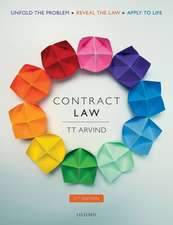Seduction by Contract: Law, Economics, and Psychology in Consumer Markets
Autor Oren Bar-Gillen Limba Engleză Paperback – 17 oct 2013
| Toate formatele și edițiile | Preț | Express |
|---|---|---|
| Paperback (1) | 216.53 lei 31-37 zile | |
| OUP OXFORD – 17 oct 2013 | 216.53 lei 31-37 zile | |
| Hardback (1) | 494.58 lei 31-37 zile | |
| Oxford University Press – 22 aug 2012 | 494.58 lei 31-37 zile |
Preț: 216.53 lei
Nou
Puncte Express: 325
Preț estimativ în valută:
41.43€ • 43.38$ • 34.28£
41.43€ • 43.38$ • 34.28£
Carte tipărită la comandă
Livrare economică 27 martie-02 aprilie
Preluare comenzi: 021 569.72.76
Specificații
ISBN-13: 9780199663378
ISBN-10: 0199663378
Pagini: 2989
Dimensiuni: 156 x 234 x 17 mm
Greutate: 0.44 kg
Editura: OUP OXFORD
Colecția OUP Oxford
Locul publicării:Oxford, United Kingdom
ISBN-10: 0199663378
Pagini: 2989
Dimensiuni: 156 x 234 x 17 mm
Greutate: 0.44 kg
Editura: OUP OXFORD
Colecția OUP Oxford
Locul publicării:Oxford, United Kingdom
Recenzii
What makes Bar-Gills argument both fresh and impressive is its detailed exploration of actual consumer markets and its careful argument that myopia, unrealistic optimism, and a lack of salience are playing a significant role in those markets.
Exceptionally illuminating and packed with findings and ideas. Seduction By Contract is important reading for those interested in behavioral economics, human behavior, and some of the most important policy debates of the current decade."
Professor Bar-Gill, a pioneer in the injection of psychological realism into economic analysis of law, has written a very timely and very important book on consumer contracts, and specifically on the ominous ingenuity with which modern marketers exploit the incapacity of so many consumers to understand complex contractual terms, especially relating to credit. His book will inform administrative and judicial regulation of consumer contracts.
This book shows why Oren Bar-Gill was the first winner of the American Law Institute's Young Scholars Medal. Economics and psychology are melded to explain legal reforms that would improve the contractual rights of consumers who obtain credit cards, mortgages, or cell phones. This is first-class legal scholarship that can influence public policy.
As Oren Bar-Gill's designated rational choice "nemesis," I applaud his ambitious efforts to account for the role of human error in the full range of consumer transactions. His bold claim that product and service providers, even in competitive markets, are able to manipulate the terms of standard form contracts to their private advantage, if sustainable, creates a prima facie case for government regulation of these consumer markets. Bar-Gill's work promises to be at the center of a continuing debate of national importance.
Oren Bar-Gill argues that consumer contracts are often both inefficient and exploitative in predictable ways, and illustrates with case studies. The claim is provocative but plausible, and the analysis addresses many of an economist's follow-on questions. I look forward to teaching from this book.
Exceptionally illuminating and packed with findings and ideas. Seduction By Contract is important reading for those interested in behavioral economics, human behavior, and some of the most important policy debates of the current decade."
Professor Bar-Gill, a pioneer in the injection of psychological realism into economic analysis of law, has written a very timely and very important book on consumer contracts, and specifically on the ominous ingenuity with which modern marketers exploit the incapacity of so many consumers to understand complex contractual terms, especially relating to credit. His book will inform administrative and judicial regulation of consumer contracts.
This book shows why Oren Bar-Gill was the first winner of the American Law Institute's Young Scholars Medal. Economics and psychology are melded to explain legal reforms that would improve the contractual rights of consumers who obtain credit cards, mortgages, or cell phones. This is first-class legal scholarship that can influence public policy.
As Oren Bar-Gill's designated rational choice "nemesis," I applaud his ambitious efforts to account for the role of human error in the full range of consumer transactions. His bold claim that product and service providers, even in competitive markets, are able to manipulate the terms of standard form contracts to their private advantage, if sustainable, creates a prima facie case for government regulation of these consumer markets. Bar-Gill's work promises to be at the center of a continuing debate of national importance.
Oren Bar-Gill argues that consumer contracts are often both inefficient and exploitative in predictable ways, and illustrates with case studies. The claim is provocative but plausible, and the analysis addresses many of an economist's follow-on questions. I look forward to teaching from this book.
Notă biografică
Oren Bar-Gill is a Professor of Law and co-Director of the Center for Law, Economics and Organization at the New York University School of Law. Bar-Gill joined the NYU faculty in January 2005 from Harvard University, where he was a Fellow at the Society of Fellows, as well as an Olin Fellow at Harvard Law School. Bar-Gill holds a B.A. (economics), LL.B., M.A. (law & economics), and Ph.D. (economics) from Tel-Aviv University, as well as an LL.M. and S.J.D. from Harvard Law School.Bar-Gill's scholarship focuses on the law and economics of contracts. His more than 30 articles have been published in leading law reviews and peer-reviewed journals. In 2011, Bar-Gill's work on consumer contracts was recognized by the American Law Institute, which awarded him its inaugural Young Scholar Medal. Bar-Gill is currently a co-Reporter for the American Law Institute's project on the Law of Consumer Contracts. Bar-Gill is a member of the Board of Directors of the American Law and Economics Association. He advises both government agencies and private sector parties on issues pertaining to consumer contracts and consumer protection.



















